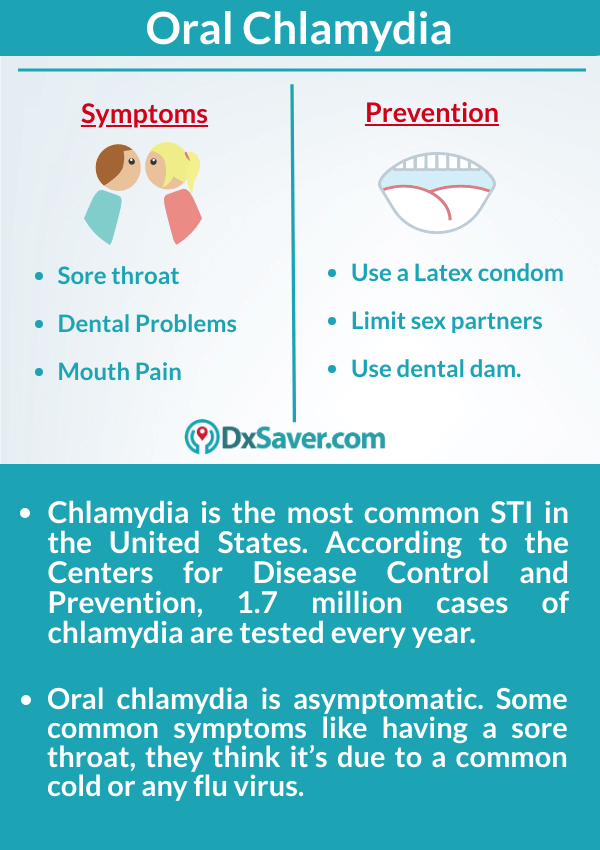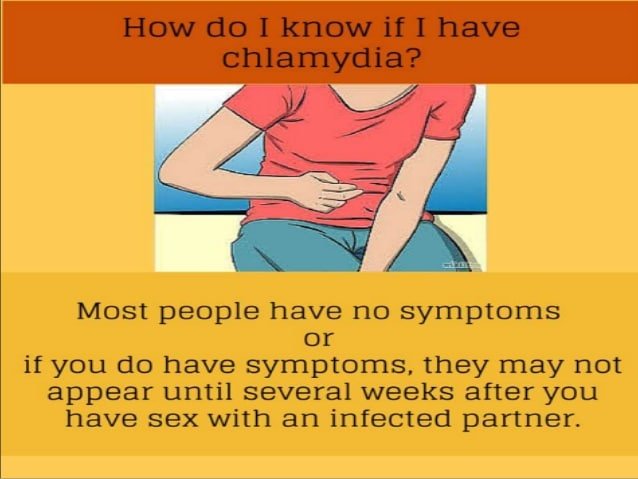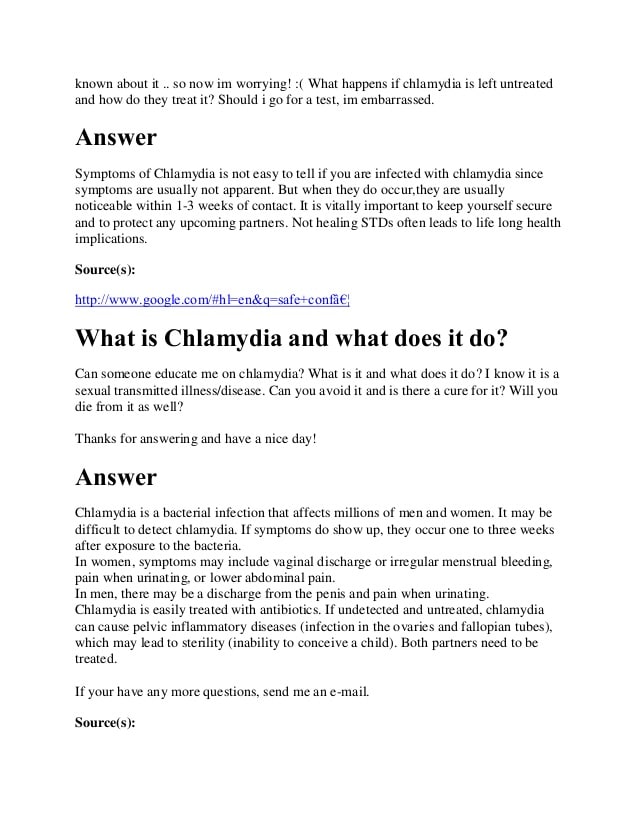Put Sex On Hold During And After Chlamydia Treatment
If you were given a single dose of antibiotics to treat your chlamydia, you should not have any kind of sex for a full seven days after the day you took the medicine. If youre taking antibiotics for a week, wait another seven days after the last day of your treatment. Be sure to take all of the medicine that is prescribed for you.
Not having sex for seven days after treatment is important so you dont spread the infection to your partner or partners.
Medication stops the infection and can keep you from spreading the disease, but it wont cure any permanent damage that the infection caused before you started treatment. In women, such damage can include blocking the fallopian tubes, causing infertility.
If you still have symptoms for more than a few days after you stop taking your medicine, go back to see your doctor or other healthcare provider so they can check you again.
I Was Treated For Chlamydia When Can I Have Sex Again
You should not have sex again until you and your sex partner have completed treatment. If your doctor prescribes a single dose of medication, you should wait seven days after taking the medicine before having sex. If your doctor prescribes a medicine for you to take for seven days, you should wait until you have taken all of the doses before having sex.
Do I Need To Have A Test To Check That The Chlamydia Has Gone
If you take the treatment according to the instructions, you wont usually need a test to check the chlamydia has gone.
If youre aged under 25, you should be offered a repeat test 3 months after finishing the treatment. This is because youre at a higher risk of getting chlamydia again.
Whatever your age, you may need a repeat test or more treatment if:
- you think youve come into contact with chlamydia again
- you had sex without a condom with a partner before the treatment for both of you was finished
- you didnt complete the treatment or didnt take it according to the instructions
- the signs and symptoms dont go away
- your test was negative but you develop signs or symptoms of chlamydia
- youre pregnant.
A repeat test can be done 56 weeks after the first test.
If the chlamydia was in your rectum , you may need another test around 3 weeks after finishing the treatment. Your doctor, nurse or clinic will let you know if you need another test.
You can go back to the doctor, nurse or clinic if you have any questions or need advice on how to protect yourself from infection in the future.
You May Like: Medication For Chlamydia Side Effects
Can Chlamydia Kill You
As already mentioned before, this infection won`t cause any issues if treated right away. However, if it`s left untreated, it may lead to severe problems, especially when talking about women:
- It the infection spreads, it may cause PID. This severe medical condition might make it difficult or even impossible for a woman to conceive.
- Expecting mothers who experience this infection frequently pass it to their own future babies during delivery. If the condition gets in the eyes of the child, it may lead to blindness. Babies can have other issues, such as pneumonia, which can become deadly in a infant.
- Having this particular infection makes anyone a lot more likely in getting HIV from other persons who are infected with HIV. This virus causes AIDS.
Can You Get Chlamydia More Than Once

Yes, you can get the infection even if youve successfully treated it already.
A sexual partner who has chlamydia can transmit it to you again, even if youve already had it and treated it.
You can also get chlamydia again if it wasnt fully treated the first time. This can happen if you stop taking the necessary treatment. Its important to complete the antibiotics youve been given, even if your symptoms get better.
The CDC recommends getting tested 3 months after treatment of your initial infection to ensure the infection is cleared.
Read Also: Does Chlamydia Make You Nauseous
What Kind Of Antibiotics Clear Chlamydia
If you are diagnosed with chlamydia, your doctor will prescribe oral antibiotics. A single dose of azithromycin or taking doxycycline twice daily for 7 to 14 days are the most common treatments and are the same for those with or without HIV. With treatment, the infection should clear up in about a week.
What Happens If Chlamydia Isn’t Treated
Only some people who have chlamydia will have complications. If chlamydia is treated early, its unlikely to cause any long-term problems. But, without proper treatment, the infection can spread to other parts of the body. The more times you have chlamydia the more likely you are to get complications.
- If you have a vulva, chlamydia can spread to other reproductive organs causing pelvic inflammatory disease . This can lead to long-term pelvic pain, blocked fallopian tubes, infertility and ectopic pregnancy .
- In people with a vulva, chlamydia can also cause pain and inflammation around the liver, though this is rare. This usually gets better with the correct antibiotic treatment.
- If you have a penis, chlamydia can lead to infection in the testicles. If this isnt treated, theres a possibility it could affect your fertility but more research is needed to understand how likely this is.
- Rarely, chlamydia can lead to inflammation of the joints. This is known as Sexually Acquired Reactive Arthritis and is sometimes accompanied by inflammation of the urethra and the eye. This is more likely to occur in people with a penis than people with a vulva.
You May Like: What It Feels Like To Have Chlamydia
What Is The Best Drug For Chlamydia
Azithromycin is considered one of the two best antibiotics for chlamydia treatment. It is very easy to take, only requiring a single dose, and cures the disease in 95% of cases. People with chronic, recurring cases of chlamydia do particularly well when treated with this drug, and it is considered safe to be used during pregnancy.
What Are The Treatments For Chlamydia
If you are diagnosed with chlamydia, your doctor will prescribe oral antibiotics. A single dose of azithromycin or taking doxycycline twice daily for 7 to 14 days are the most common treatments and are the same for those with or without HIV.
With treatment, the infection should clear up in about a week. Do not have sex for at least 7 days until you have taken all of your medication, and do not stop taking the antibiotics even if you feel better.
Your doctor will also recommend that your partner be treated as well to prevent reinfection and further spread of the disease.
Women with serious infections, such as pelvic inflammatory disease, may require a longer course of antibiotics or hospitalization for intravenous antibiotics. Some severe pelvic infections may require surgery in addition to antibiotic therapy.
Make sure you get retested after three months to be certain the infection is gone. Do this even if your partner has been treated and appears to be infection free.
You May Like: Long Term Effects Of Chlamydia
Getting Treated For Chlamydia And Often Gonorrhea
If you have your own doctor, he will prescribe the antibiotics you need to treat chlamydia. If you dont have your own doctor, you can often find free or low-cost care at either a Planned Parenthood site or a community health clinic.
Listen carefully to the instructions for taking the medicine that you are given by the doctor or other healthcare provider, and follow them closely.
Ask questions if you dont understand something. Also, if you have other questions as you take your medicine, you can always call the pharmacist for help. They are often easier to reach than the doctor.
If you test positive for chlamydia, your healthcare provider is likely to also recommend that you be treated for gonorrhea. This is because the cost of treating gonorrhea is less than the cost of testing for the infection.
Urogenital Infection In Men
In men, chlamydial infection of the lower genital tract causes urethritis and, on occasion, epididymitis. Urethritis is secondary to C. trachomatis infection in approximately 15 to 55 percent of men, although the prevalence is lower among older men.2 Symptoms, if present, include a mild to moderate, clear to white urethral discharge. This is best observed in the morning, before the patient voids. To observe the discharge, the penis may need to be milked by applying pressure from the base of the penis to the glans.
The diagnosis of nongonococcal urethritis can be confirmed by the presence of a mucopurulent discharge from the penis, a Gram stain of the discharge with more than five white blood cells per oil-immersion field, and no intracellular gram-negative diplococci.2 A positive result on a leukocyte esterase test of first-void urine or a microscopic examination of first-void urine showing 10 or more white blood cells per high-powered field also confirms the diagnosis of urethritis.
For diagnosis of C. trachomatis infection in men with suspected urethritis, the nucleic acid amplification technique to detect chlamydial and gonococcal infections is best .4 Empiric treatment should be considered for patients who are at high risk of being lost to follow-up.
Read Also: How To Get Chlamydia Pills
Does Chlamydia Cause Cervical Cancer
No, chlamydia doesn’t cause cervical cancer.
It’s possible to get a sexually transmitted infection by having sex with someone who has an STI, even if they have no symptoms.
The following measures will help protect you from most STIs including chlamydia, gonorrhoea and HIV.
If you have an STI, they’ll also help prevent you from passing it on to someone:
- Use condoms every time you have vaginal or anal sex.
- If you have oral sex , use a condom to cover the penis, or a dam to cover the vulva or anus.
- Avoid sharing sex toys. If you do share them, wash them or cover them with a new condom before anyone else uses them.
How Accurate Are The Tests

The accuracy of a chlamydia test depends on the kind of test used and the type of sample thats collected. The recommended tests are over 95% accurate in picking up chlamydia. As no test is 100% accurate theres a small chance that the test will give a negative result when you do have chlamydia. This is known as a false negative result. This can sometimes explain why you might get a different result from another test or why you and a partner might get a different test result.
Its possible for the test to be positive if you havent got chlamydia, but this is rare.
You May Like: Does Azithromycin 250 Mg Treat Chlamydia
Can I Buy Chlamydia Treatment Over The Counter
Wondering if you can get chlamydia medicine over the counter? There is currently no chlamydia treatment available over the counter, you will need to meet with a doctor before getting chlamydia treatment. This is to confirm your chlamydia diagnosis and ensure that antibiotic treatment is safe for you.
How Do You Prevent Chlamydia
Using a new male or female condom or dental dam every time you have sex is the best way to protect against chlamydia.
Chlamydia can be passed on by sharing sex toys. Always cover sex toys with a new condom and wash them after use to reduce your risk of getting chlamydia and other STIs.
Its important to regularly test for chlamydia, even if you dont have any symptoms, especially if youve had multiple sexual partners.
The contraceptive pill and other types of contraception wont prevent you getting chlamydia, and neither will PrEP.
Recommended Reading: How Long To Wait To Get Tested For Chlamydia
How Long Does Chlamydia Take To Clear Up
Chlamydia typically goes away within 1 to 2 weeks. You should avoid sex during this time to prevent transmitting the disease. Your doctor may prescribe a one-dose medication or a medication youll take daily for about a week. If they prescribe a one-dose pill, you should wait 7 days before having sex again.
How Do I Recognize The Signs
Chlamydia, like most STIs, is often asymptomatic that means most people wont experience any signs of the infection. If the signs do appear, both women and men will be equally affected. Even though these signs can affect different areas in the body, both sexes will experience them in a similar way.
Here are the most typical signs for women:
- Pain during menstruation
- Fever with pain in the abdomen
- Excessive vaginal discharge often with a bad odor
- Pain during intercourse
- Burning and itching around or in the vagina
- Bleeding when not on a period
Even though women are more prone to chlamydia, men can still get infected.
Don’t Miss: How Long Can Chlamydia Last Without Treatment
Chlamydia Cdc Fact Sheet
Chlamydia is a common sexually transmitted disease that can be easily cured. If left untreated, chlamydia can make it difficult for a woman to get pregnant.
Basic Fact Sheet | Detailed Version
Basic fact sheets are presented in plain language for individuals with general questions about sexually transmitted diseases. The content here can be syndicated .
Can Chlamydia Come Back On Its Own
For people who were treated for this infection, it is perhaps not time to worry yet. Reemergence doesn`t happen that often, and when this infection return, it can still be treated. But if it does happen for a case to repeat itself, it may not be the right moment to blame the partner for cheating yet.
Don’t Miss: How To Tell If You Have Chlamydia Or Gonorrhea
Does The Treatment Work
Usually, yes. You can infect another sex partner as soon as you get chlamydia. Most women and some men do not have early signs of the disease.
A pregnant women can also pass on the infection to her baby as it is being born. This can lead to infection of the eyes and lungs in the infant. It is important to inform people you have had sex with during the past 3 months because they may have the disease and not know they need treatment. Your public health nurse will contact your partner if you prefer. Your name will be kept confidential.
How Long Does It Take For A Male To Show Signs Of Chlamydia

Symptoms in the penis
Symptoms of chlamydia may affect the penis within 13 weeks of the person coming into contact with the infection. In some cases, though, these symptoms can take months to appear. Symptoms of chlamydia in the penis may include: white, cloudy, or watery discharge from the tip of the penis.
Don’t Miss: Chlamydia Make You Pee A Lot
What Is The Treatment For Chlamydia
Chlamydia can be easily cured with antibiotics. HIV-positive persons with chlamydia should receive the same treatment as those who are HIV-negative.
Persons with chlamydia should abstain from sexual activity for 7 days after single dose antibiotics or until completion of a 7-day course of antibiotics, to prevent spreading the infection to partners. It is important to take all of the medication prescribed to cure chlamydia. Medication for chlamydia should not be shared with anyone. Although medication will stop the infection, it will not repair any permanent damage done by the disease. If a persons symptoms continue for more than a few days after receiving treatment, he or she should return to a health care provider to be reevaluated.
Repeat infection with chlamydia is common. Women whose sex partners have not been appropriately treated are at high risk for re-infection. Having multiple chlamydial infections increases a womans risk of serious reproductive health complications, including pelvic inflammatory disease and ectopic pregnancy. Women and men with chlamydia should be retested about three months after treatment of an initial infection, regardless of whether they believe that their sex partners were successfully treated.
Infants infected with chlamydia may develop ophthalmia neonatorum and/or pneumonia. Chlamydial infection in infants can be treated with antibiotics.
Antibiotics For Chlamydia: Treatment
Antibiotics work very well to treat infections like Chlamydia and Gonorrhea. Unlike gonorrhea bacterium which is intra-cellular the Chlamydia bacterium is inter-cellular and live within the cell of the host. So the antibiotics have to kill the bacterium rather than merely destroy its cell walls. Some antibiotics do it with great potency and the infection is generally cured within 10 days.
Chlamydia Antibiotics like Doxycycline and Azithromycin are the preferred antibiotics. They have a very high cure rate of only a week in up to 98% of cases. Few cases might take longer to cure. It is also advised to complete the course of antibiotics even after the disease is cured within a week so as to eliminate any residual strains.
Penicillin was a very popular antibiotic used to treat STD-like Gonorrhea and Chlamydia. Over the years though the Chlamydia and Gonorrhea bacterium have mutated to exhibit resistance and immunity to penicillin. Due to that it is no longer the preferred antibiotic to treat chlamydia. Other medications like ofloxacin, erithromycin and Levofloxacin can be used but they carry increased risk of side effects. Moreover their cure rates are not as good as azithromycin and doxycycline.
Recommended Reading: Free Clinics For Chlamydia Testing
Chlamydia Symptoms & Treatment
FAST FACTS
- Chlamydia is a sexually transmitted infection that is normally passed on through sex without a condom or sharing sex toys with someone who has the infection.
- Using male or female condoms and dental dams during sex will help to protect you from getting chlamydia.
- Chlamydia is often symptomless however if left untreated it can lead to long-term health problems.
- Chlamydia is easily treated with antibiotics.
- Chlamydia can be passed on from mother to child during pregnancy, so its important for pregnant women to get tested.